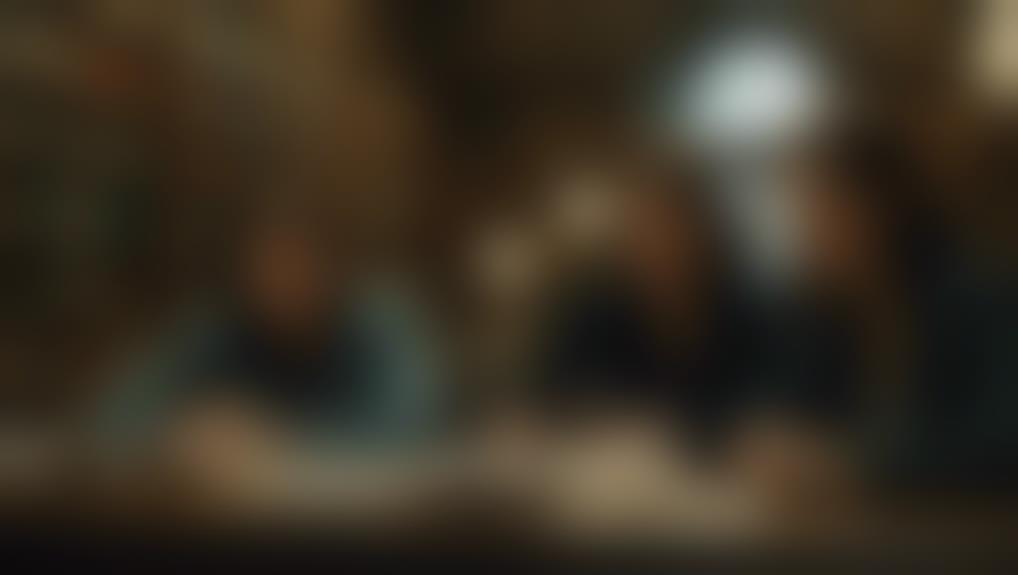Step into the enthralling narrative of 'The Secret History' by Donna Tartt, where the allure of dark academia, moral complexities, and intricate characters come together to create a hauntingly mesmerizing tale. Explore the depths of intellectual pursuit, loyalty, betrayal, and the blurred lines between teacher and student relationships. Uncover a world where secrets unravel with chilling consequences, enticing you to reflect on human nature and the pursuit of forbidden knowledge. Intrigue awaits as you discover the rich tapestry of themes and literary influences that make this novel a timeless masterpiece. Curiosity piqued? There's much more to uncover in this captivating journey.
Background of 'The Secret History'
Indisputably, the background of 'The Secret History' sets the stage for understanding its profound impact on the literary world. Donna Tartt's debut novel, 'The Secret History,' initially titled 'The God of Illusions,' was published in September 1992 by Alfred A. Knopf with a striking design by Chip Kidd and Barbara de Wilde. The first edition's substantial 75,000 print order catapulted the book into popularity, establishing itself as a cornerstone of the dark academia literary sub-genre.
Tartt's 'The Secret History' explores themes rooted in Greek tragedy and Nietzsche's Apollonian and Dionysian expressions. The book intricately weaves a narrative examining elitism, intellectualism, friendship, loyalty, betrayal, secrecy, guilt, and moral ambiguity.
Central to the story is the character Bunny, whose presence and actions shape the unfolding of the gripping tale. As you immerse yourself in 'The Secret History,' you'll find a rich tapestry of secrets, academia, and human complexities waiting to be unraveled.
Characters in the Novel
The characters in 'The Secret History' play pivotal roles in shaping the intricate and dark narrative of Donna Tartt's debut novel. Here's what makes them stand out:
- Richard Papen
- Serves as the narrator and outsider of the group.
- Henry Winter
- Portrays a complex and enigmatic leader figure.
- Bunny Corcoran
- Adds a sense of lightheartedness which contrasts with the group's dark deeds.
- Camilla Macaulay
- Her relationships, especially with her twin brothers, intensify the story's dynamics.
- Charles Macaulay
- His presence and interactions contribute to the tension within the group.
Each character brings a unique set of traits and flaws, creating a web of relationships that drive the plot forward. Critics and readers have differing views on the depth of these characters, with some finding them compelling and others desiring more emotional depth.
The interactions and conflicts among Richard, Henry, Bunny, Camilla, and Charles add layers of complexity to the novel's storyline.
Themes Explored
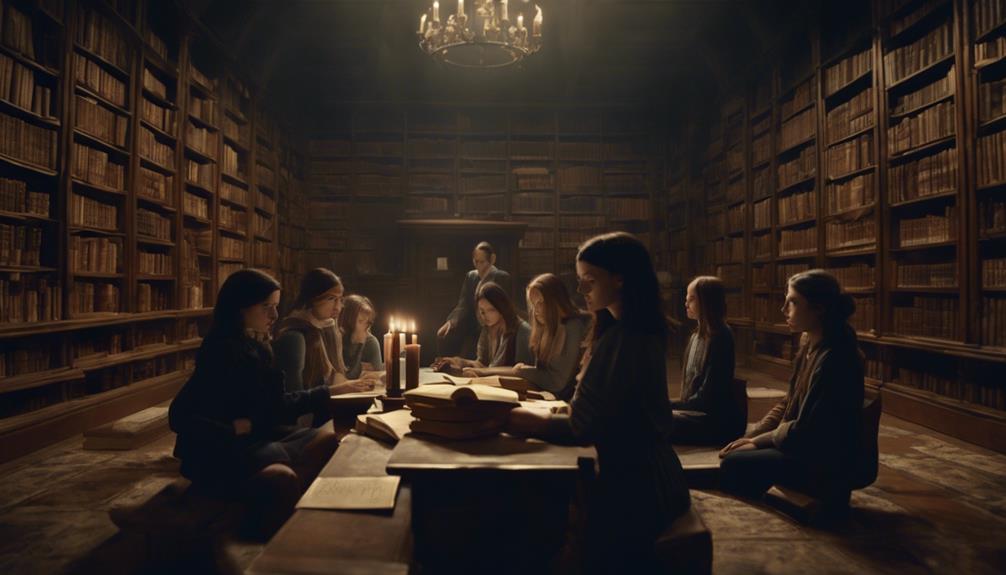
The Secret History captivates with its exploration of the allure of Dark Academia, examining moral ambiguity and shedding light on complex student-teacher relationships.
These themes intertwine to create a rich tapestry of intellectualism, loyalty, and betrayal, offering a glimpse into the darker aspects of human nature.
As you immerse yourself in the novel, you'll find yourself drawn into a world where boundaries blur, and the consequences of actions reverberate with haunting resonance.
Dark Academia Allure
Exploring the allure of dark academia in 'The Secret History' reveals a complex blend of intellectual intrigue and moral ambiguity. Donna Tartt expertly weaves elements of elitism and intellectualism into the narrative, creating a compelling world of forbidden knowledge and academic obsession.
Here are some key aspects that contribute to the dark academia allure in the novel:
- Mystery and Intrigue: The novel's exploration of dark secrets, mysterious rituals, and intellectual pursuits adds an air of mystique that draws readers in.
- Complex Characters: The flawed and morally ambiguous characters in 'The Secret History' mirror the allure of dark academia, where intellect often clashes with ethics.
- Forbidden Knowledge: The theme of pursuing knowledge at any cost, even if it leads to darkness, highlights the seductive nature of the academic world depicted in the novel.
- Descent into Darkness: The gradual unraveling of the characters' morality and their descent into darker actions showcases the dangerous allure of the intellectual elite.
- Pretentiousness and Sociopathy: The themes of pretentiousness and sociopathy among the characters add a chilling layer of intrigue to the narrative, keeping readers engaged till the dark academia-themed conclusion.
Moral Ambiguity Dissected
Delving into the ethical complexities of 'The Secret History' reveals a narrative that challenges conventional moral standards. Richard, the protagonist, finds himself entangled in a web of moral ambiguity as he becomes involved with a group of classmates led by the enigmatic and morally ambiguous Camilla.
The murder that serves as the central event in the novel acts as a catalyst, blurring the lines between right and wrong for Richard and his peers. The consequences of their actions ripple through the story, forcing them to confront the darker aspects of their own natures.
Donna Tartt skillfully navigates the intricacies of morality, portraying characters who grapple with guilt, betrayal, and the weight of their choices. As friendships are tested and loyalties strained, 'The Secret History' prompts readers to reflect on the complexities of ethical dilemmas and the profound impact of moral ambiguity on individuals and their relationships.
Student-Teacher Relationships Analyzed
Analyzing the student-teacher relationships in 'The Secret History' sheds light on the complex dynamics of mentorship and power within the narrative. In Donna Tartt's novel, these relationships are pivotal in shaping the characters and driving the plot forward.
The classics serve as a backdrop for the intricate student-teacher relationships, adding depth to the narrative.
Mentorship is portrayed as a double-edged sword, showcasing both the positive guidance and the darker manipulative aspects.
Power dynamics play a significant role in the interactions between students and authority figures, blurring boundaries and influencing decisions.
The character of Professor Julian Morrow embodies the complexities of authority figures, wielding both intellectual prowess and emotional control over his students.
The loyalty and devotion of the students to Julian highlight the impact of charismatic mentors on impressionable minds, leading to a web of secrets and moral dilemmas within the group.
Literary Influences and Impact
Drawing inspiration from Greek tragedy and Nietzsche's theories, Donna Tartt's 'The Secret History' has left a lasting impact on the literary world through its exploration of dark academia themes and complex characters. Tartt's incorporation of Greek tragedy elements, like hubris and fate, adds depth to the novel's narrative, while Nietzsche's dichotomy between the controlled Apollonian and the chaotic Dionysian influences the characters' actions and motivations.
This blend of influences hasn't only shaped 'The Secret History' but also paved the way for the rise of the dark academia sub-genre in literature. The novel's success has resonated with readers, leading to a devoted following and sparking interest in works that investigate similar themes of intellectualism, moral dilemmas, and secrecy within academic settings.
Tartt's intricate examination of elitism, friendship dynamics, and ethical ambiguity has solidified 'The Secret History' as a modern classic, widely studied for its storytelling prowess and dark, atmospheric allure. Its impact extends beyond the pages, influencing discussions in academic circles and inspiring new generations of readers and writers to explore the complexities of dark academia literature.
Dark Academia Genre Analysis
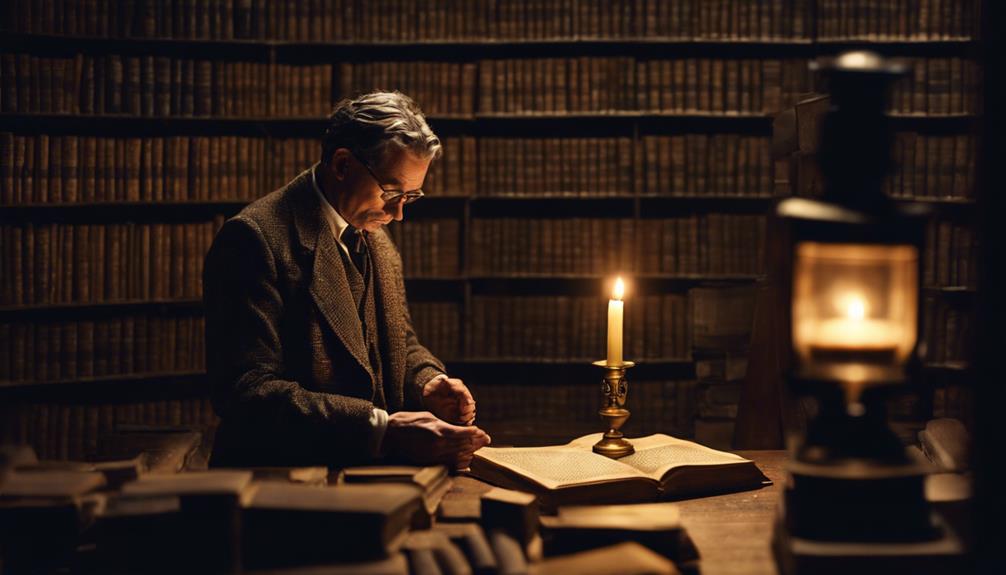
You'll notice that the allure of dark academia lies in its investigation of intellectual pursuits intertwined with darker themes. Themes of obsession, guilt, and the intricacies of human nature often take center stage in this genre.
As you explore dark academia works, you'll uncover a rich tapestry of moral ambiguity and psychological depth that sets them apart.
Dark Academia Appeal
Dark academia enthusiasts are captivated by the intellectual depth and haunting allure portrayed in 'The Secret History' by Donna Tartt. The novel's exploration of obsession, guilt, and the pursuit of forbidden knowledge resonates with readers who are drawn to the following aspects of dark academia literature:
- The focus on intellectualism and academia as central themes.
- The examination of complex characters grappling with moral ambiguity.
- The atmospheric setting that immerses readers in a dark and haunting world.
- The meticulous writing style and detailed descriptions that enhance the overall atmosphere.
- The influence of 'The Secret History' in sparking a renewed interest in dark academia literature, inspiring other works to explore similar themes of academia, mystery, and tragedy.
Donna Tartt's masterful storytelling in 'The Secret History' continues to captivate audiences, inviting them to investigate the darker aspects of academia and human nature.
Themes in Genre
Exploring the themes within the dark academia genre reveals a rich tapestry of intellectualism, moral ambiguity, and haunting narratives that captivate readers.
Donna Tartt's novel, 'The Secret History,' epitomizes these elements, delving into the dark underbelly of elitism and obsession within an exclusive group of classics students.
The novel intricately weaves together themes of guilt, consequences of actions, and the allure of forbidden knowledge, drawing readers into a world where academia intertwines with sinister undertones.
'The Secret History' exemplifies the essence of dark academia, characterized by its focus on academic settings and intellectual pursuits tinged with macabre events. Tartt's exploration of complex characters and philosophical themes adds depth to the narrative, creating an atmospheric and immersive reading experience.
The novel's themes of obsession and elitism resonate with audiences seeking a compelling blend of mystery, intellectualism, and moral complexity, solidifying its place as a standout work in the dark academia genre.
Critical Reception and Reviews
Critics have lauded 'The Secret History' for its innovative narrative structure and depiction of an outsider's perspective within the group. Some readers appreciate the deep narrative, unique writing style, and complex characters in the book.
Feedback on the novel ranges from praising its depth and complexity to critiquing its length and pacing. The novel's pacing has been a point of contention, with some critics finding it slow and prone to unnecessary details.
Donna Tartt's writing style in 'The Secret History' is praised for its detailed descriptions and immersive storytelling, enhancing the exploration of themes like friendship, betrayal, and the pursuit of the picturesque at all costs.
Film Adaptation Attempts
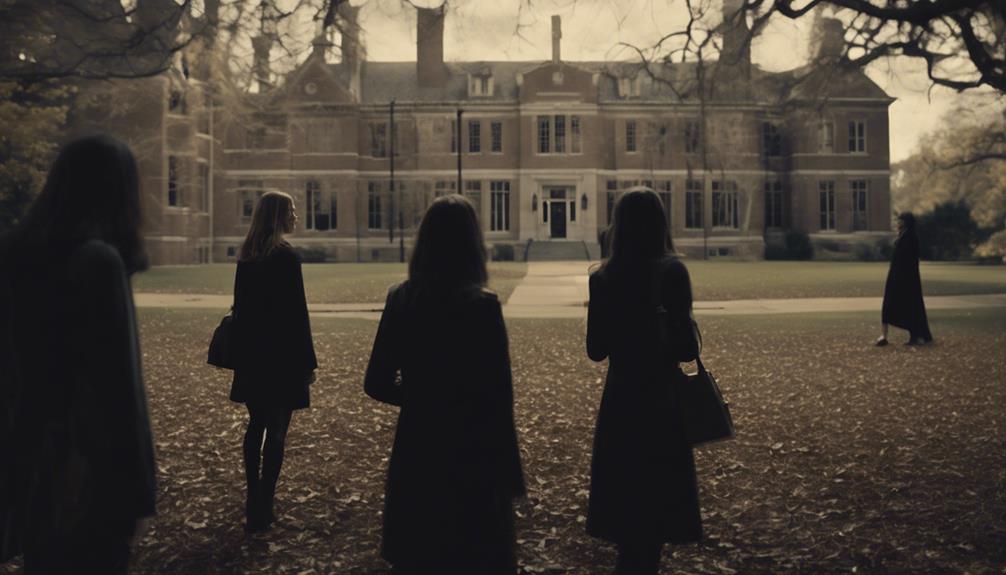
Attempts to adapt 'The Secret History' by Donna Tartt into a film have faced numerous challenges and setbacks over the years. Despite the novel's popularity and compelling dark academia themes, bringing it to the screen has proven difficult.
One notable setback occurred when producer Alan J. Pakula acquired the film rights in 1992, only for the project to be abandoned after his passing. This event created hurdles for subsequent film adaptation attempts, as finding the right vision and team to translate Tartt's intricate narrative onto film became increasingly challenging.
The allure of 'The Secret History' for adaptation lies in its complex characters like Charles and Henry, as well as its dark atmosphere. However, capturing these elements effectively on screen has been a significant challenge.
Discussions and articles continue to explore the difficulties in adapting the novel, focusing on the need to accurately portray its nuanced characters, intricate plot, and dark academia setting to do justice to Tartt's work.
Author Donna Tartt's Writing Style
Donna Tartt's writing style in 'The Secret History' immerses readers in a rich and vivid world, blending detailed descriptions with intellectual depth to enhance the novel's themes and characters. Her writing envelops you in a dark atmosphere, where every word paints a haunting picture that lingers in your mind.
Here are some key aspects of Donna Tartt's writing style:
- Immersive Prose: Tartt's descriptive language pulls you into the story, making you feel like you're a part of the secretive and mysterious world she's crafted.
- Intellectual Depth: The profound ideas and philosophical musings woven into the narrative add layers of complexity, challenging readers to ponder deeper themes.
- Balanced Atmosphere: The mix of academic intrigue and emotional depth creates a unique reading experience that resonates long after you finish the book.
- Complex Characters: Tartt's writing skillfully captures the intricacies of her characters, giving them a sense of authenticity and depth that keeps you engaged.
- Personal Influence: The author's own life experiences and influences shine through, enriching the narrative with a sense of authenticity and depth.
Discussion Questions for Readers
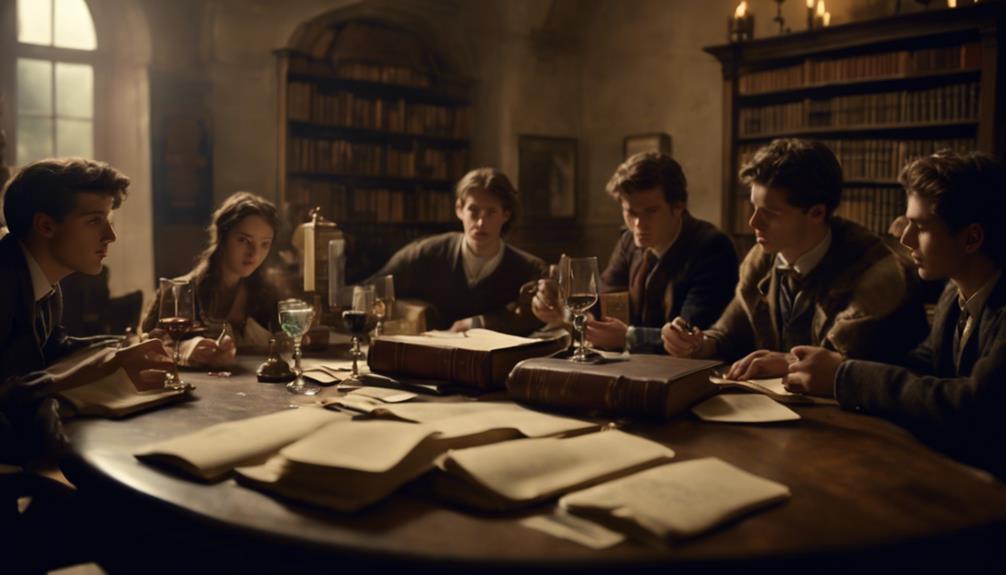
Explore the thought-provoking discussion questions that investigate the complex characters and dark themes of 'The Secret History' by Donna Tartt.
Reflect on the intricate dynamics of friendship portrayed in the novel. How do the characters' relationships with each other evolve throughout the story, and what role does loyalty play in shaping these connections?
Consider the theme of betrayal and its impact on the characters' actions and motivations. How does betrayal drive the narrative forward and contribute to the overall tone of the book?
Delve into the allure of forbidden knowledge in 'The Secret History.' What drives the characters to seek out and engage with knowledge that's deemed forbidden or dangerous?
Reflect on the consequences of their pursuit of such knowledge and how it shapes their identities and decisions. How does the theme of forbidden knowledge intertwine with other central themes in the novel, such as elitism, intellectualism, and moral ambiguity?
Explore these questions to gain deeper insights into the world Donna Tartt has crafted.
Conclusion
As you immerse yourself in the pages of 'The Secret History,' you'll find yourself engulfed in a world of dark academia where secrets unravel and intrigue abounds.
Like a hidden gem waiting to be discovered, Donna Tartt's masterpiece captivates with its rich characters, complex themes, and haunting prose.
Engage with this literary masterpiece and uncover the layers of deception and obsession that lie beneath the surface.
The journey awaits, beckoning you to untangle its mysteries like a twisted web of fate.

